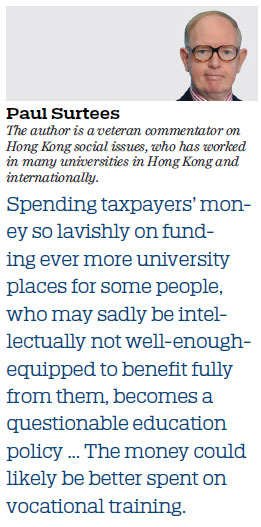HK may be producing more graduates than jobs suitable for them
Updated: 2019-07-23 08:47
(HK Edition)
|
|||||||
A recent survey into the earnings of new Hong Kong graduates produced the startling finding that over the past 25 years, their starting salaries have actually dropped. Of course, not every young person, who puts in the great effort and expense needed to obtain a degree, does it expecting to eventually receive a markedly higher salary than a school-leaver joining the workforce. Some see their tertiary studies, taking their favorite subject at a higher level, as a means of self-fulfillment. While that may be all very well and good, the stark reality is that a job will still be needed, when they eventually exit the university gates for the last time.
When, historically, only a small proportion of school-leavers went on to university, holding a degree had great scarcity value. Fresh graduates represented the elite, and employers were eager to pay top dollar to get those bright youngsters working for them. In those days, there were more graduate-level jobs available than there were suitable for fresh graduates. But nowadays, the proportion of graduates in the workforce has ballooned to about 35 percent, and is still growing. Sadly, the number of truly graduate-level jobs in the workforce has not increased at the same rate, leaving us with a glut of graduates unable to obtain a graduate-level job.

Numerous fresh graduates enter the job market at a level not requiring a degree. Indeed, it is estimated that about one in six of our fresh graduates is reduced to taking an unskilled job. A truly graduate-level job brings in the graduate at an appropriately-higher level, as their entry grade. Mind you, that's generally all it does: From then on, it will be only their job performance that determines their career prospects, degree or no degree.
A recent government study projected that Hong Kong will face a shortage of workers of about 100,000 by 2027. Those unfilled vacancies are however likely to be at the lower end of the pay scale, rather than comprising graduate-level jobs.
With an unemployment rate of almost 20 percent, South Korea is addressing their similar predicament in novel ways. Of those aged 15 to 29, some 25 percent of them are unemployed. They are risking a "brain drain" by running programs under their K-move scheme, to place their young graduates in jobs overseas. Of the almost 6,000 youth placed last year, about a third went to Japan. A problem with this scheme, however, is that by no means all these overseas jobs offered are at the graduate level: some represent basic-level tasks. If you're going to end up working in a factory, shop or restaurant, you may well come to regret taking the trouble and expense of getting a degree.
Perhaps our Hong Kong educational authorities, spending as they do HK$114 billion ($14.59 billion) a year (representing 20 percent of the total government expenditure) on education, could reallocate some of those vast financial resources to helping our own new graduates find suitable jobs overseas. That measure is needed, because clearly we are producing more graduates than there are local graduate-level jobs available - an example of supply outrunning demand.
Hong Kong's education policy looks towards an ever-increasing proportion of school-leavers going on to higher education. Indeed, Hong Kong already boasts some 20 degree-awarding institutions, about half of which are in the private sector. To accommodate those who may be less academically gifted, standards are sometimes dropped to enable them to enter a university course and get a degree; though that degree might well be looked at askance by any potential employer, especially if it is an associate degree, from a second-tier college, or obtained by distance learning. In short, if almost everyone has a degree, its scarcity value is lost.
Some opine that not everyone in the community has the intellectual ability and determination needed to study a subject at a real university level. We can't all be brain surgeons, after all! Someone still has to be found to drive a truck, sweep the floor and wait at a table, and some need not have a degree to perform their work tasks. Having a policy of pushing for an ever-growing proportion of those entering the workforce with a degree raises unrealistic expectations, when the sad reality is that many of them may end up taking unskilled work at the end.
Spending taxpayers' money so lavishly on funding ever more university places for some people, who may sadly be intellectually not well-enough-equipped to benefit fully from them, becomes a questionable education policy. The money could likely be better spent on further developing the public offerings in vocational training, which lead more readily to a suitable job.
(HK Edition 07/23/2019 page9)